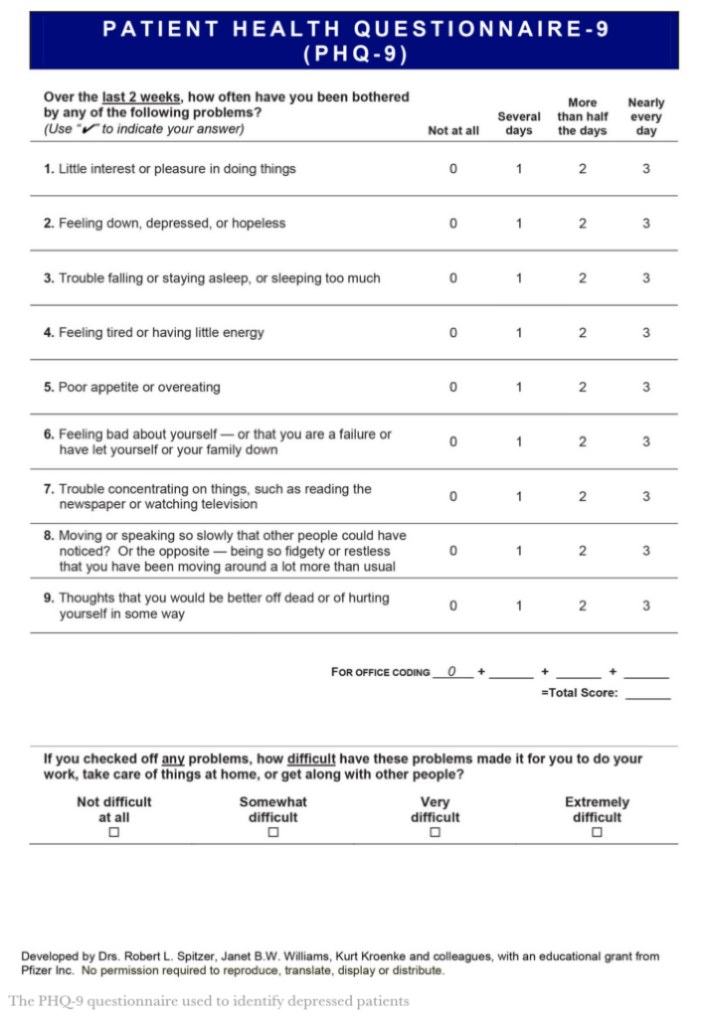Here we were, reading another story about the unlimited greed of Pfizer, when this chart popped up. Not only did Pfizer sucker a bunch of MD's into using this Bee Ess as a 'diagnostic' tool; they also arranged for it to be a part of the life of every US citizen over the age of 65.
Let's back up a bit.
For Americans not yet convinced of Pfizer’s intentionally sinister role in the declining physical and mental health of our nation, the billion-dollar company’s behind-the-scenes funding of the test widely used for depression is another decisive example. Specifically, while searching in the late 1990s for ways to encourage primary care doctors to prescribe its newly-released antidepressant Zoloft (sertraline)—instead of presenting peer-reviewed scientific research—Pfizer teamed up with a marketing whiz named Howard Kroplick, who devised a simple checklist that created a sense of certainty and accuracy around a mental illness diagnosis....
Gotta sell some Zoloft, so how do we get MD's to prescribe it?
Easy!! We come up with a completely bullshit "questionnaire"!!

If you're over 65, you've seen that series of questions; it's part of your annual Medicare "physical" checkup.
That begs the question: who in the CMMS (Medicare/Medicaid) hierarchy got the payoff--the bribe--for placing this into a required annual exam?
...To this day, despite several experts stating the form was never meant to be a diagnostic test to diagnose mental illness, the “go-to” checklist is routinely and effortlessly handed out to patients during primary care check-ups and OB-GYN visits—regardless of whether a patient has voiced mental health concerns. The nine questions touch on a range of issues that sets the threshold for anxiety and depression “far too low,” according to UK-based psychotherapist James Davies, co-founder of the Council for Evidence-based Psychiatry.
In 2017, a concerned Davies remarked that the form, which should only be used as a conversation starter between doctor and patient, if at all, resulted in patients being wrongly diagnosed and medicated. For example, patients whose symptoms may stem from unusually stressful or traumatic episodes in their lives end up being labeled as clinically depressed or anxious. With U.S.-based multinational Pfizer manufacturing most of the commonly prescribed SSRI drugs for anxiety and depression in the UK....
To be fair, Eli Lilly was first into the $Billion market with its Prozac. Pfizer was merely playing catch-up.
But it's not only the Old Farts that get scrips for SSRI's.
...Unfortunately—in what is the most incompetent, deceptive, and utterly devastating aspect of this entire catastrophe—SSRIs like Zoloft are eagerly prescribed to teenagers like candy, leading to more significant mental health crises and, tragically, even suicide. Frances points out that Pfizer failed to even consider the “disastrous unintended consequences” of relying too heavily on its checklist—namely, the tool has a high false positive rate, which served Pfizer’s interests, but not those of patients and, most especially, our children....
SSRI's have a very bad reputation, especially when fed to under-21's.
...in 2004, the FDA began requiring that all antidepressants include a “black box warning” on package inserts for the drug. Short of withdrawing a drug from the market, a black box warning is the FDA’s strongest available measure. The warning for antidepressants mentions the increased risk of teen suicidal ideation. In addition, it mentions the potential for increased hostility and agitation in children, adolescents, and young adults....
Hostility, agitation, suicidal tendencies.........
Where have we seen that set of symptoms lately? Children shooting each other over 'diss'? Mass shootings by under-30's? How about that 'suicide' thing? Is 'hostility' a problem before or after the SSRI is prescribed by a pediatrician or GP? Hmmmmm??
While the Medicare-Geriatric club is not likely to suffer those effects, there's still this: what makes a GP competent to diagnose mental illness?
Yah, I know. Tony Fauci.
No comments:
Post a Comment